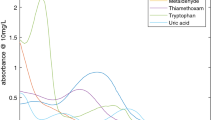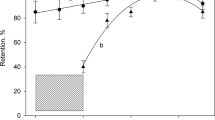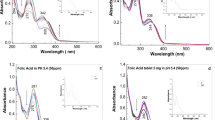Abstract
FOR several years I have obtained consistent results with the hydrogen peroxide method1 for the estimation of uranium, the intensity of the peruranate colour being measured with a Pulfrich photometer with filter S.43 (effective filter gravity, 434 mµ). In the hope of achieving greater accuracy and reproducibility, a modern type of spectrophotometer was recently substituted for the visual photometer, the colours being measured at 360 mµ (where the extinction for a given uranium content is nearly three times greater than at 434 mµ). It was found, however, that results were frequently low by as much as 30 per cent, although the same solutions gave the correct result when the absorption was measured with the Pulfrich photometer.
This is a preview of subscription content, access via your institution
Access options
Subscribe to this journal
Receive 51 print issues and online access
$199.00 per year
only $3.90 per issue
Buy this article
- Purchase on Springer Link
- Instant access to full article PDF
Prices may be subject to local taxes which are calculated during checkout
Similar content being viewed by others
References
Sandell, E. B., "Colorimetric Determination of Traces of Metals" (Interscience Publishers, Inc., New York, 1944).
Author information
Authors and Affiliations
Rights and permissions
About this article
Cite this article
SCOTT, T. A Source of Error in the Colorimetric Estimation of Uranium. Nature 163, 768–769 (1949). https://doi.org/10.1038/163768b0
Issue Date:
DOI: https://doi.org/10.1038/163768b0
This article is cited by
-
Verteilung von Uran(VI) und Thorium zwischen Alkalinitratl?sungen und 5 Vol-% Tri-n-butylphosphat/Kerosen
Fresenius' Zeitschrift f?r Analytische Chemie (1967)
-
Absorption Spectra of the Sodium Peruranates
Nature (1950)
-
Absorptiometric Determination of Uranium
Nature (1949)
Comments
By submitting a comment you agree to abide by our Terms and Community Guidelines. If you find something abusive or that does not comply with our terms or guidelines please flag it as inappropriate.



